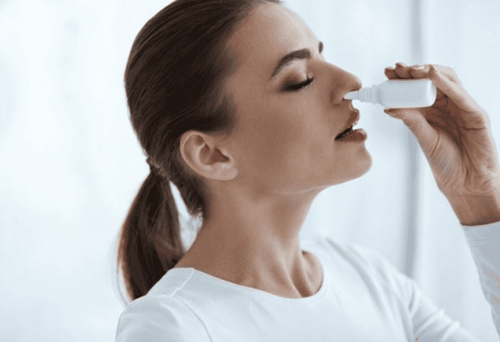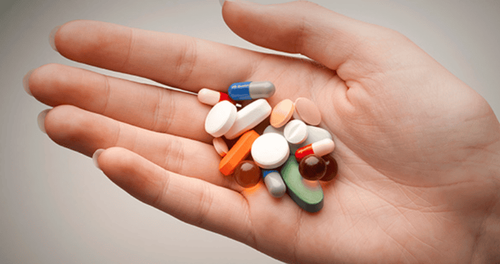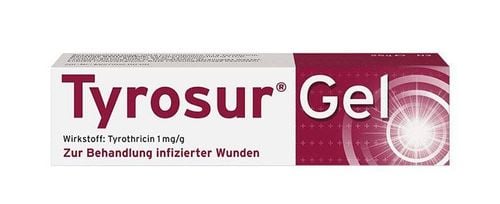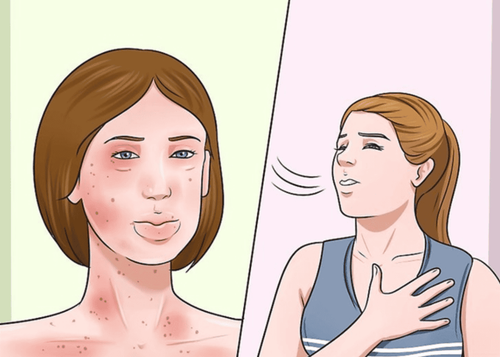This is an automatically translated article.
Bilodin is a drug with an antihistamine effect and is used in cases of allergies. The drug works to relieve symptoms of allergic diseases such as allergic rhinitis, acute or chronic urticaria.
1. What is the effect of Bilodin?
Bilodin medicine has the main ingredient Loratadin 10mg, prepared in the form of tablets. Loratadine is a potent antihistamine with selective peripheral H1-receptor antagonist activity. Tricyclic antihistamines have a prolonged effect on selective peripheral H1 receptors and do not have a calming effect on the central nervous system. 1. Loratadin also has anti-itching and histamine-related urticaria effects. However, Loratadine is not clinically protective or helpful in severe histamine release such as anaphylaxis.
After oral administration, Loratadine is rapidly absorbed and unaffected by food.
2. Indications and contraindications of the drug Bilodin
2.1. Indications Bilodin is indicated to help relieve the symptoms of allergic diseases:
Seasonal allergic rhinitis or perennial allergic rhinitis: Sneezing, stuffy nose, runny nose, itchy nose and cough. Allergic conjunctivitis or spring conjunctivitis: Itchy, red, watery, and hot eyes. Symptoms of acute or chronic urticaria; Allergic skin disorders. 2.2.Contraindications Bilodin is not used in the following cases:
Patients with hypersensitivity to any drug ingredients. Children younger than 6 years old.
3. Dosage and how to use Bilodin
How to use: The drug is taken orally, patients can take it before or after eating.
Dosage:
For adults and children over 12 years old: Take 1 tablet per day. Children 6-12 years old: If the child is 30 kg or more, use as an adult is 1 tablet 1 time / day; If the child is less than 30 kg, use 1/2 tablet once a day. Patients with mild renal impairment and the elderly: No dosage adjustment is required. Patients with severe hepatic impairment: The starting dose is 10 mg orally every other day for adults and children weighing more than 30 kg. Patients with severe renal impairment (creatinine clearance < 30 ml/min): 10 mg orally every other day for adults and children over 6 years of age.
4. Overdose and forgotten dose of Bilodin how to handle?
4.1.Overdose In adults, when taking an overdose with loratadine tablets (40 - 180 mg), can cause manifestations such as excessive drowsiness, tachycardia, headache. In children, extrapyramidal manifestations and palpitations have been observed in overdoses exceeding 10 mg per day. Treatment of overdose is symptomatic treatment and life support. Activated charcoal (suspension) may be used, and gastric lavage may also be considered. Loratadine is not eliminated by peritoneal dialysis or hemodialysis. Patients with an overdose of Bilodin should be rested and closely monitored after emergency treatment.
4.2.Forgotten dose When you forget to take a dose, take it as soon as possible. However, if you remember it is almost time for your next dose, skip the missed dose and continue taking your next dose at the scheduled time. Do not take twice the prescribed dose to make up for the missed dose.
5. Side effects when taking Bilodin
When using the drug loratadine can cause some side effects, especially with doses greater than 10mg daily. Some possible side effects include:
Common: Headache, dry mouth due to decreased saliva production. Uncommon: Dizziness, dry nose can cause nosebleeds and sneezing. Conjunctivitis. Rare: Causes depression with symptoms of depression, loss of interest in things, loss of appetite or overeating, sleep disturbances; Tachycardia, supraventricular tachycardia, palpitations, palpitations; Nausea; Abnormal liver function; irregular menstruation; External rash, urticaria, anaphylactic shock. Patients should use loratadine at the lowest dose to be effective and reduce unwanted effects. You need to inform your doctor if you experience other undesirable effects while using the drug.
6. Things to keep in mind when taking Bilodin
In the process of using Bilodin, patients should note some of the following issues:
When taking loratadine, there is a risk of causing dry mouth, especially common in the elderly, increasing the risk of tooth decay. Therefore, you need to clean your teeth when using loratadine. For patients with liver failure, the drug should be used with extreme caution. Because of the risk of liver toxicity. Loratadine should be discontinued at least 48 hours prior to the allergen skin test, as antihistamines may prevent or reduce reactions to the dermatological index that may cause misdiagnosis or misdiagnosis. Pregnancy: There are currently no adequate and well-controlled studies on whether the use of loratadine during pregnancy affects the unborn baby. Therefore, loratadine should be used during pregnancy only when clearly needed and carefully considered. Besides, patients should use low dose, short treatment time. Lactation: Loratadine and its metabolite descarboethroxyloratadine are excreted in human milk. If it is absolutely necessary to use loratadine in a nursing woman, it should be used only in low doses and for a short time, or breast-feeding can be discontinued during the treatment period. Ability to use machines: Because some patients may experience drowsiness while taking loratadine, although uncommon it may affect the ability to drive or use machines. You should pay attention in the first time when using the drug to avoid the risk of causing an unnecessary accident. Drug interactions: Some drugs that can interact with Bilodin include cimetidine, erythromycin antibiotics, ketoconazole, quinidine, fluconazole, fluoxetine, when used in combination, it increases blood levels of loratadine and increases side effects.
Storage: store the medicine in a sealed package, away from moisture, away from direct light. Keep medicine out of reach of children and do not use when showing signs of damage.
Bilodin is used to relieve allergy symptoms, but does not remove the cause of the allergy. Therefore, the best measure is that you should find the allergen and stay away from it. If you have any questions about taking the medicine, you should consult your pharmacist or doctor for advice.
Follow Vinmec International General Hospital website to get more health, nutrition and beauty information to protect the health of yourself and your loved ones in your family.
Please dial HOTLINE for more information or register for an appointment HERE. Download MyVinmec app to make appointments faster and to manage your bookings easily.













